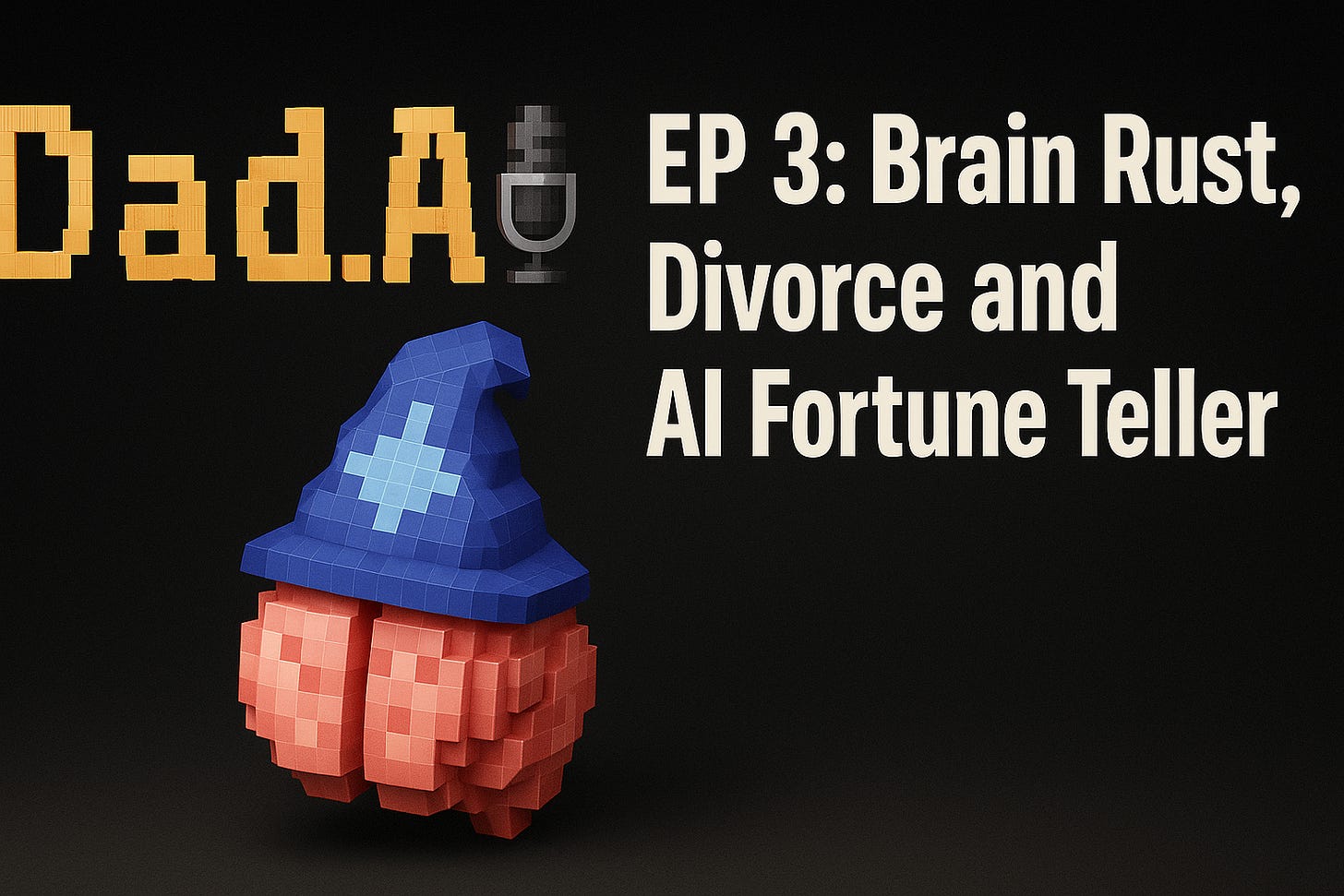Brain Rust, Divorce and AI Fortune Teller
Dad.AI Episode 3 Recap
Watch on Youtube | Listen on Spotify
Navigating Parenthood in the AI Era:
Welcome back! Here is the latest episode of Dad.AI, where technology meets the realities of raising a family. This episode we explained a bit more of our content’s purpose "a weekly water cooler for parents," diving deep into how AI is shaping our personal lives, from surprising use-cases to potential pitfalls, and, how it can empower us to be better parents and partners.
AI as a Creative Partner for Family Moments
The discussion kicked off with a fascinating look at how AI can enhance personal and family moments. Jake shared how he embraced AI for Mother's Day, using ChatGPT to:
Create an outline from his daughter's drawing.
Synthesize ideas for fill-in-the-blank activities.
Generate cartoon versions of family photos.
Even render a child's drawing into a design for a custom necklace made by an Etsy artist.
Jake, being the ultimate family man, showcased AI's potential as a creative assistant (I.e., Chuck), helping parents personalize and elevate everyday family gestures.
The Big Picture: AI's Impact on Society and Health
Beyond personal anecdotes, the podcast touched upon the broader implications of AI, particularly in healthcare. A striking point from an Allie Miller post, quoting a Nobel Prize winner, suggested the eradication of disease within the next decade. While inspiring, this raised questions about societal challenges like overpopulation and food shortages, balanced by AI's potential to also address these issues through advancements in areas like crop disease and pollution management. The episode underscored a strong optimism for AI's role in mental, social, and physical health.
The Double-Edged Sword: Brain Rust and Over-Reliance
A significant portion of the conversation revolved around "brain rust"—the idea that over-reliance on AI tools might atrophy our cognitive skills. While AI can boost productivity (summarizing meetings, drafting emails), we both debates whether outsourcing tasks like crafting bedtime stories or engaging in critical thinking could hinder our innate abilities and imagination. The key takeaway: AI should be an "accelerant," not a "crutch." The challenge for parents is to empower children (and themselves) to use AI in ways that accelerate learning and efficiency while preserving essential human skills.
Navigating AI in Relationships and Legalities
The episode presented two cautionary tales, revealing the more unsettling side of AI's integration into personal life:
Coffee Grounds and Divorce: A couple used ChatGPT-4's image model to "read" coffee grounds for fortune-telling. The AI's "prediction" of infidelity led to a divorce. This stark example emphasized the danger of relying on AI for critical life decisions, stressing the importance of human intuition and trust in relationships. Neither Jake nor I believe AI should be used as a fortune teller or reading your horoscope.
AI-Generated Testimony in Court: An AI-generated video of a deceased person was used in court to express forgiveness during a killer's sentencing. This raised serious ethical questions about AI's admissibility in legal proceedings, the subjectivity of AI-created content, and its role in sensitive personal matters like grief. While acknowledging the potential for AI to preserve loved ones' memories (e.g., through collecting raw footage with tools like Mento), we both strongly cautioned against its use in making subjective judgments in official contexts.
AI for Time Wealth: Becoming a More Present Parent
Perhaps the most impactful segment focused on how AI can genuinely free up parents' time, allowing for more presence and engagement with family. Inspired by the community post about gaining "25 hours a week back”.
AI Tutors: Using tools like ChatGPT with memory to help children with homework, explain concepts in their own language, and create personalized study plans and quizzes. This transforms parents from teachers into more engaged partners, reducing frustration for everyone.
Strategic Delegation: Consciously choosing to delegate tasks to AI (from calendaring to emailing) to become more productive and create "time wealth."
AI Voice Assistants: Utilizing AI voice tools during activities like walks to capture thoughts, which can then be transformed into usable content, effectively multi-threading personal time with productivity.
AI for Bedtime Stories: Despite the "brain rust" debate, the idea of using AI to generate stories means "two stories for the price of one," allowing parents more precious time with their children, especially when their own brains are "cooked" at the end of the day.
Our goal is to democratize and simplify AI as a strategic partner, enabling parents to reclaim time and be more active and present in our children's lives.
We hope these insights from Dad.ai help you navigate the evolving landscape of parenting with technology. As always, "hug your kids, hug your partner, with love from Dad.AI”



